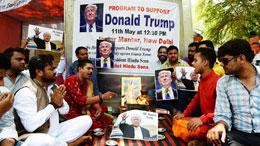“Trump is not a threat to India”

The election of Donald Trump as U.S. president has unsettled governments across Asia, possibly more so than in other regions of the world.
Thanks to Trump's unconventional rhetoric and out-of-the-box propositions, Asia is struggling to come to grips with unforeseen scenarios in U.S. foreign policy.
Fundamental alterations of national strategies rather than cosmetic recalibrations will be required to manage the challenge of "Trump the unpredictable.", reports Asia Nikkei.com
According to Sreeram Chaulia, dean at the Jindal School of International Affairs, Trump has raised tremendous hopes in India by announcing that he would be "best friends" with Prime Minister Narendra Modi in the common fight against "radical Islamic terrorism".
“In effect, this means an even closer strategic alignment between Washington and New Delhi at the cost of Pakistan and China, which have been warily watching a closer India-U.S. strategic partnership during the Obama years,” he wrote.
Trump's anti-Muslim bias and fervent desire to go down in history as the man who crushed Islamist extremism will ultimately drag him into formal or informal alliances in Asia and the Middle East that would stoke existing rivalries or create new ones.
Trump’s anti-Muslim rhetoric likely wouldn’t get in the way of pushing new contracts for American arms makers, for whom India is a major market.
Trump’s crusade against China’s economic power would also favor New Delhi in its strategic rivalry with Beijing. Then throw in Pakistan, whose troubled but longstanding alliance with the U.S. has been a serious problem for India. Clinton, who took twice as many trips to Pakistan as to India during her tenure at the State Department, worked hard to keep Pakistan onside during the Obama presidency. Trump, on the other hand, has declared Pakistan “the most dangerous country in the world other than Iran.”
Trump’s rise is also being viewed as the latest setback for India’s ambition to become a factory for the world, reported Bloomberg.
Having missed the export-driven steam-boat that transformed China and fellow East Asian economies over the past several decades, India under Prime Minister Narendra Modi had pinned hopes on an ambitious "Make in India" campaign to make up lost ground.
With the world’s biggest consumer market soon to be overseen by a president who’s pledged to bring manufacturing jobs back to America and raise barriers to imports, that hardly helps Modi’s cause. Britain’s vote in June to leave the European Union had already given impetus to a shift toward protectionism in developed nations, casting a pall on emerging-market prospects.
“In the medium to long-term, a Trump presidency would add to India’s woes,” said Priyanka Kishore, lead Asia Economist at Oxford Economics in Singapore. “It would impact India’s engine of growth -- the services sector — negatively and also accelerate the nominalization of India’s services and services exports growth, which is an emerging source of concern.”
The U.S. is India’s largest export market and one of its largest foreign investors.
Trump’s policy mix could slow planned U.S. investment abroad, and place curbs on immigration, especially the information-technology workers that India specializes in. Trump has characterized so-called H-1B visas as hurting American workers. Indians account for a big share of these — 70 percent of those approved in 2014 were to people born in the country -- and they offer Indian companies a critical way to skill up their staff.
At the same time, there are plenty of reasons for Trump to look favorably on economic ties with India, which has been a geostrategic rival of China in south Asia. American companies like Wal-Mart Inc., Facebook Inc. and Apple Inc. want to boost their presence in India, with its swelling middle class, and top executives including Mark Zuckerberg and Tim Cook have toured the country seeking opportunities in a nation of 1.3 billion people.
“India represents one of the most attractive long-term growth markets for U.S. exports,” said Rajiv Biswas, Singapore-based chief economist for Asia-Pacific at IHS Global Insight. Foreign direct investment rose to a record in 2015, official data show.
Any threat to India isn’t imminent, and much depends on whether Trump’s turns campaign rhetoric into policy reality. When the rest of the world was glued to Trump’s stunning election victory, most of India was more interested in the government’s shock move to ban 500 and 100 rupee notes. Without warning, Modi sought to withdraw banknotes equivalent to 86 percent of the money in circulation in an attempt to crack down on black money and tax evasion.
“Trump is not a threat to India,” said Trinh Nguyen, a senior economist at Natixis SA in Hong Kong. “It is the timing of its ambition to industrialize that is a bit off. And that doesn’t mean it won’t receive FDI. The country is expected to be one of the few ones with rapidly growing demand. It just means that the government will have to work harder to make it more competitive.”
Still, Trump’s election adds risks for Asia’s third-biggest economy. There are already existing economic tensions, especially in the technology sector. India’s government has banned Facebook’s free web service and declined to exempt Apple from local sourcing rules.
“Even before Trump, many have had doubts whether robotization, and an increasingly protectionist and less material world are already making it difficult for India to repeat China’s path,” said Nguyen.
Meanwhile a report said two-term Louisiana Governor Bobby Jindal, the first ever Indian-American to be elected as a state Governor, is among the shortlisted candidates for Donald Trump's Cabinet.
If appointed, the 45-year-old will be first ever Indian-American to be included in the president's cabinet and second ever to be elected to the US Congress.
– agencies









